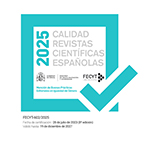La propaganda política en las elecciones presidenciales venezolanas del 2006: estudio de las estrategias de argumentación
Resumen
El presente estudio tiene como propósito describir y analizar las estrategias comunicativas utilizadas por los partidos políticos en la propaganda de las elecciones presidenciales venezolanas del año 2006. Analizamos un corpus de 420 propagandas publicadas en 4 periódicos venezolanos durante la campaña electoral entre agosto y diciembre del 2006. Los datos se analizaron cualitativamente. Encontramos que las propagandas de Hugo Chávez proponen mundos posibles (MP) habitados por hechos, verdades y presuposiciones, conectados mediante estrategias argumentativas de enlace. Manuel Rosales presenta MP opuestos: representa al gobierno pasado de Chávez como negativo, caracterizado por el odio, la corrupción, la división, y propone un MP+ futuro de bienestar sin él. Concluimos que las obras de gobierno de los candidatos, consideradas buenas pero inconclusas, cumplen un papel fundamental para la construcción y conexión de los mundos posibles y para la argumentación.Descargas
Descarga artículo
Licencia
La revista Estudios sobre el Mensaje Periodístico, para fomentar el intercambio global del conocimiento, facilita el acceso sin restricciones a sus contenidos desde el momento de su publicación en la presente edición electrónica, y por eso es una revista de acceso abierto. Los originales publicados en esta revista son propiedad de la Universidad Complutense de Madrid y es obligatorio citar su procedencia en cualquier reproducción total o parcial. Todos los contenidos se distribuyen bajo una licencia de uso y distribución Creative Commons Reconocimiento 4.0 (CC BY 4.0). Esta circunstancia ha de hacerse constar expresamente de esta forma cuando sea necesario. Puede consultar la versión informativa y el texto legal de la licencia.










